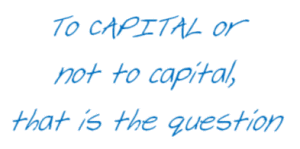I hope you find my writing and business tips and observations useful. My business and blog are dedicated to helping businesses communicate clearly and reach their potential.
Read, subscribe to my newsletter, enjoy!Tash
Capital letters
I suspect the increased use of SMS and chat shorthand is a major factor, but it seems that many people aren’t sure about when to use capital letters in their writing. So here is a quick summary of when to use a capital letter:
- for the word I – this word must always be written as a capital letter, to do otherwise looks out of place and attracts attention to the lack of attention to detail. As part of an SMS message, I might accept it, but I leave websites where they repeatedly use a lower case i
- to start a sentence – this helps make it clear it is a new sentence and this in turn makes it easier to understand the message and individual ideas
- for all proper nouns – that is, any word that is the name of something specific for example Tash, Melbourne, Australia, Australians and Word Constructions. It does not include generic names such as mothers, business owners, writers, city or students.* Note that the word I is actually a proper noun so my first point is covered here but it was worth a separate point!
- in acronyms – where just the first letter of each word is used to represent the name of something. For instance, the ATO represents the Australian Tax Office and ASAP represents as soon as possible. It doesn’t matter if the full title uses capitals or not, acronyms generally use capitals (sometimes a business may choose to brand themselves with a lower case acronym)
- the start of speech, even if it is not the start of a sentence. For example, she said “We must pay attention to the use of capital letters.”
- days of the week and names of months, as well as names of specific periods of history (e.g. the Second World War, the Depression)
- titles of books, articles, movies and so on can be written in title case (e.g. Full Moon Rising) or just with a starting capital letter (e.g. Confessions of a supermom)
Capitals letters are sometimes also used within names (e.g. AvSuper, MacGregor), in scientific terminology (e.g. E. Coli, Eucalyptus, cyclone Tracy) and where two words have been abbreviated into one (e.g. eBooks, eLearning.)
There are variations in some of these rules, especially if you travel to another country but using these guidelines will avoid any major errors! Or call upon someone to check your writing for you – errors that requires conscious effort for you to find often are quite obvious to others, especially to someone like me who spots such things without trying.
Edited to add: I came across a fun poster with the basic capital letter uses, which is great for kids and anyone struggling to remember these rules.
* The use of a generic noun as a proper noun requires a capital letter, too. So while mothers is written in lower case, a capital letter applies in the following sentence: Mary said “Hello Mother. How are you?” Likewise, you may write about a library (generic) or the Ashburton Library (specific).





